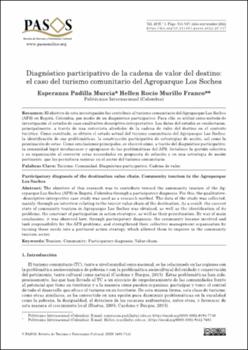Diagnóstico participativo de la cadena de valor del destino: el caso del turismo comunitario del Agroparque Los Soches
Date
2022Abstract
El objetivo de esta investigación fue contribuir al turismo comunitario del Agroparque Los Soches
(APS) en Bogotá, Colombia, por medio de un diagnóstico participativo. Para ello, se utilizó como método de
investigación el estudio de caso cualitativo‐descriptivo‐interpretativo. Los datos del estudio se recolectaron,
principalmente, a través de una entrevista alrededor de la cadena de valor del destino en el contexto
turístico. Como resultado, se obtuvo el estado actual del turismo comunitario del Agroparque Los Soches,
la identificación de sus problemáticas, la construcción participativa de estrategias de acción, así como la
priorización de estas. Como conclusiones principales, se observó cómo, a través del diagnóstico participativo,
la comunidad logró involucrarse y apropiarse de las problemáticas del APS, fortalecer la gestión colectiva
y su organización al convertir estas necesidades en propuesta de solución y en una estrategia de acción
pertinente, que les permitiera mejorar en el sector del turismo comunitario. The objective of this research was to contribute toward the community tourism of the Ag‐
roparque Los Soches (APS) in Bogotá, Colombia through a participatory diagnosis. For this, the qualitative‐
‐descriptive‐interpretive case study was used as a research method. The data of the study was collected,
mainly, through an interview relating to the tourist value chain of the destination. As a result, the current
state of community tourism in Agroparque Los Soches was obtained, as well as the identification of its
problems, the construct of participation in action strategies, as well as their prioritisation. By way of main
conclusions, it was observed how, through participatory diagnosis, the community became involved and
took responsibility for the APS problems, and strengthened their collective management organisation by
turning these needs into a pertinent action strategy, which allowed them to improve in the community
tourism sector.





